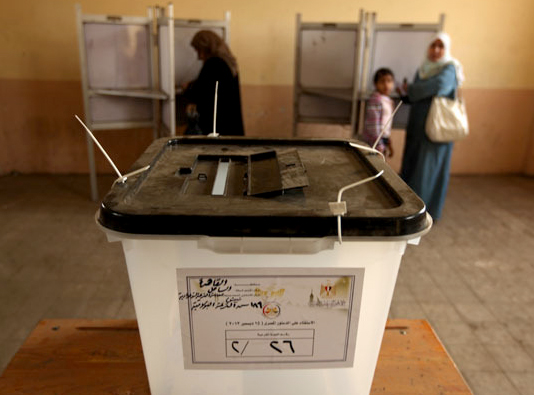President Abdel Fattah Al-Sisi appointed 28 members in the parliament Thursday, as reported by state media. Al-Sisi also set the date of the first parliamentary session for 10 January.
The parliament was yet to be completed, pending Al-Sisi’s appointment of 5% of the members, as stipulated by the constitution. It is possible that one of the 28 MPs appointed by Al-Sisi could become the future parliament speaker.
Among the names of the 28 MPs, as reported by state media, are Serry Seyam, former head of the Cassation Court and Supreme Judicial Council. Further, Bahaa Abu Shoka from Al-Wafd Party and Sayed Abdul Al from the Tagammu Party were also appointed.
The list comprises 14 women, including writer Lamis Gaber, university professors and doctors, as well as 14 other members, including lawyers and professors – such as the Ain Shams University President – as well as economic and judicial experts. The list also includes one female expert from the Egyptian State TV and a male journalist at Dar El-Hilal institution.
Seyam’s name has been put forth by different media reports as potential parliamentary speaker. Parliamentary elections concluded in December, as final results were announced by the Supreme Electoral Commission for 568 elected members.
More uncertainty is currently taking over regarding the parliament speaker’s choice as the political scene awaiting the presidency’s move. Last week, head of the Supreme Constitutional Court (SCC) and former interim president Adly Mansour was reported to have ‘declined’ the position. He officially met with Al-Sisi, though the outcomes of the meeting were not declared.
The official presidential spokesperson, Alaa Youssef, denied Monday news reports claiming that Mansour had accepted the appointment from Al-Sisi to the parliament, in statements to Daily News Egypt.
Several voices have called for the appointment of Mansour, 69, to be parliamentary speaker. Besides acting as Egypt’s president from July 2013 to June 2014, he has been President of the Supreme Constitutional Court of Egypt since May 2013.
He helped draft the presidential elections laws that saw Morsi elected in 2012. He also headed the constitutional hearings in 2012 that cancelled the law prohibiting members of the old regime from contesting in elections.
Mansour’s legal background has been a major reason behind his nomination for the position, since he made a career out of studying law.
- Amna Nosseir
As the oldest candidate, Amna Noseir will head the parliament temporarily, according to the law. She will run the opening session and continue to do so until a parliamentary speaker is elected.
“We are extremely happy that the position will be filled, not just by a woman, but also by somebody as reputable as Nosseir,” official spokesperson for the Free Egyptians Party (FEP) Shehab Waguih said.
Nosseir has been warning MPs of creating disputes during parliamentary sessions. “I will take immediate measures against any member’s speech that is considered disrespectful or insulting,” Nosseir said in a Sunday interview with CBC channel and called on politicians to set aside “conflicts” when in the parliament.
Official spokesperson for Future of a Nation Party (FNP) Ahmed Samy said he doubted that Nosseir would be the best person for the position in terms of handling the disparities inside the parliament but hoped she would be able to keep it under control.
FEP’s Waguih believes the opposite. “I think her career as a university professor enables her to be firm,” he said.
Nosseir won a parliamentary seat in the electoral phase in October as a member of “For the Love of Egypt” electoral list in Assiut. She seems to have different aspirations once a new parliament speaker is elected. She already announced on TV in an episode on ONTV channel that she intended to apply for the presidency of the Education Committee within the parliament.
Nosseir is a renowned professor of Islamic doctrine and philosophy at Al-Azhar University, an intellectual and thinker who served several senior university positions as well as being member of the International Union of Muslim Scholars.
The Islamic professor is popular for having analytical views and legal opinions on a series of different matters, from religion to society to politics since she also studied psychology and sociology. She is known for having “moderate” judgments when it comes to religious debates and advocating women’s empowerment.
Nosseir was also in favour of Cairo University’s decision to ban wearing the niqab (burka) while teaching, because she believes the niqab is more of a tradition rather than a requirement of Islam.




